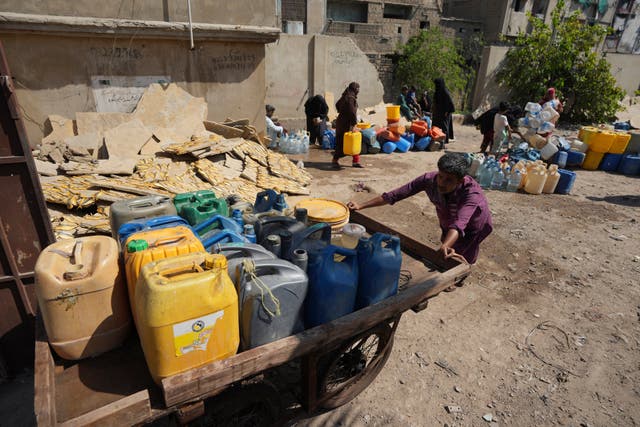
The United Nations children’s agency has warned that 10 million people in Pakistan still live in flood-affected areas without access to safe drinking water after last summer’s devastating floods.
The statement from Unicef underscored the dire situation in impoverished Pakistan, a country with a population of 220 million which is still struggling with the consequences of the flooding, as well as a spiralling economic crisis.
The floods, which experts attribute in part to climate change, killed 1,739 people, including 647 children and 353 women.
Inadequate water, sanitation and hygiene services, diseases caused by them, and climate shocks are putting the health and safety of millions of children at risk.
Our latest report: https://t.co/gKxha3SSeW pic.twitter.com/hBfR22Wqi0
— UNICEF (@UNICEF) March 21, 2023
Less than half of the agency’s funding appeal for Pakistan — 45% of £141.6 million — has been met. According to the agency, before the floods struck last June, water from only 36% of Pakistan’s water system was considered safe for human consumption.
The floods damaged most of the pipeline systems in affected areas, forcing more than 5.4 million people, including 2.5 million children, to rely solely on contaminated water from ponds and wells, Unicef said.
“Safe drinking water is not a privilege, it is a basic human right,” said Abdullah Fadil, the Unicef representative in Pakistan. “Yet, every day, millions of girls and boys in Pakistan are fighting a losing battle against preventable waterborne diseases and the consequential malnutrition.
“We need the continued support of our donors to provide safe water, build toilets and deliver vital sanitation services to these children and families who need them the most.”
Amid the crisis, Pakistan faces uncertainty about a bailout from the International Monetary Fund.

Analysts say the revival of the £4.9 billion bailout, which was signed in 2019, would help Pakistan as it would encourage other international financial institutions to help the country.
At a UN-backed conference in Geneva in January, dozens of countries and international institutions pledged more than £7.3 billion to help Pakistan recover and rebuild from the floods, but most of the pledges were in form of project loans, and the schemes are still in the planning stages.
Prime Minister Shahbaz Sharif’s government is also facing a surge in militant attacks and political instability as his predecessor, Imran Khan, campaigns for early elections.
Mr Sharif has rejected the demands by Mr Khan, who was ousted in a no-confidence vote in parliament last April.
The premier wants political and economic stability to ensure speedy reconstruction in the flood-hit areas.
Time is flying as we approach #WorldWaterDay.
The hummingbird is the star of the two-minute animated film.
She tells the tale of the water & sanitation crisis and how even the smallest #WaterAction can add up to big change.https://t.co/O3WRLNMz2u pic.twitter.com/SJ4l0FOv7A
— UN-Water (@UN_Water) February 16, 2023
“In flood-affected areas, more than 1.5 million boys and girls are already severely malnourished, and the numbers will only rise in the absence of safe water and proper sanitation,” Unicef said.
The floods caused more than £25 billion in damages as large areas of the country remained under water for months, forcing millions to live in tents or makeshift homes near stagnant waters that led to the spread of disease.
Mr Sharif’s government is also trying to provide food and cash assistance to flood survivors as the Islamic fasting month of Ramadan starts this week, adding more financial burdens to the poorest of the population.
The Unicef warning came ahead of World Water Day, which will be observed on Wednesday as part of global efforts to highlight the importance of fresh water and advocate for sustainable management.


Why are you making commenting on The Herald only available to subscribers?
It should have been a safe space for informed debate, somewhere for readers to discuss issues around the biggest stories of the day, but all too often the below the line comments on most websites have become bogged down by off-topic discussions and abuse.
heraldscotland.com is tackling this problem by allowing only subscribers to comment.
We are doing this to improve the experience for our loyal readers and we believe it will reduce the ability of trolls and troublemakers, who occasionally find their way onto our site, to abuse our journalists and readers. We also hope it will help the comments section fulfil its promise as a part of Scotland's conversation with itself.
We are lucky at The Herald. We are read by an informed, educated readership who can add their knowledge and insights to our stories.
That is invaluable.
We are making the subscriber-only change to support our valued readers, who tell us they don't want the site cluttered up with irrelevant comments, untruths and abuse.
In the past, the journalist’s job was to collect and distribute information to the audience. Technology means that readers can shape a discussion. We look forward to hearing from you on heraldscotland.com
Comments & Moderation
Readers’ comments: You are personally liable for the content of any comments you upload to this website, so please act responsibly. We do not pre-moderate or monitor readers’ comments appearing on our websites, but we do post-moderate in response to complaints we receive or otherwise when a potential problem comes to our attention. You can make a complaint by using the ‘report this post’ link . We may then apply our discretion under the user terms to amend or delete comments.
Post moderation is undertaken full-time 9am-6pm on weekdays, and on a part-time basis outwith those hours.
Read the rules here